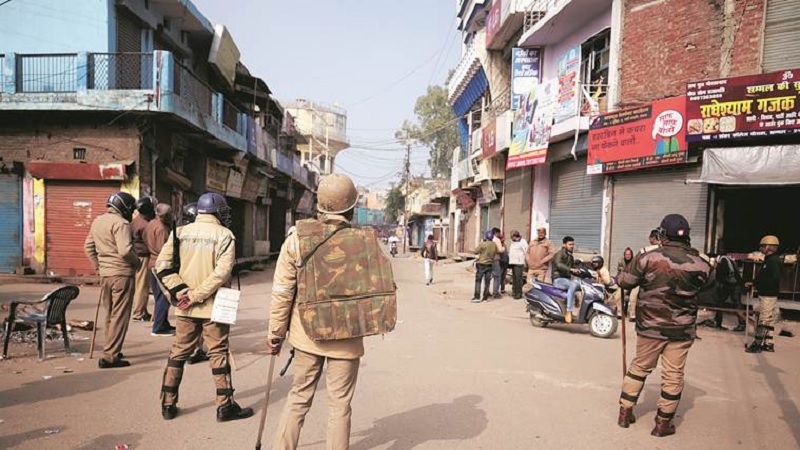 Image Courtesy: indianexpress.com
Image Courtesy: indianexpress.com
After allegedly inflicting violence on the people protesting the Citizenship Amendment Act (CAA), the Uttar Pradesh police are now resorting to ‘scare tactics’ and warning them of consequences of participating in such further protests.
Door-to-door warnings
According to The Telegraph India, the cops carry lists of alleged anti-CAA protestors and their addresses, questioning locals of their whereabouts, houses, size of families, who and where they are and their age and profession. Speaking to the publication, a senior police officer said that the scare campaign was meant to “make the people aware the police might act against them if they don’t stop the protests.”
The women, who have been staging a sit-in have also complained about the police barging into their homes and asking for information on their husbands and children and bullying them into ending the protests. A woman resident of the Kotwali area who was reportedly questioned by a dozen policemen said, “The policemen intimidate us by unnecessarily knocking at our doors. They came to my house on Thursday afternoon and asked the names of my husband and father-in-law. They alleged that my husband had been involved in anti-CAA violence in December and February. My husband supplies food to the Shah Jama Idgah (site of the largest dharna in Aligarh) but never participated in any protest.” She also added that the police had asked for the names of her two children and “jotted them down on the register”.
However, this latest drive from the police comes after they promised not to harass protesters or their families without any evidence of their direct involvement in the violence. In a bid to vacate the Quarsi Road Bypass in Aligarh City on March 1, the circle officer Anil Samania had declared, “No action will be taken against the protesters without a proper enquiry.”
But now, the Additional City Magistrate, Aligarh, Ranjeet Singh has claimed that the campaign was undertaken to reassure the women who have complained that they are threatened and forced to join the dharnas.
He said, “Many women had complained that criminals were forcing them to participate in the protests. So we started the door-to-door campaign to interact with households and prevent any unpleasant situation. (During the visits) some women said their husbands too were forcing them against their wishes to join the dharna.” He added, “We are collecting the names of the provocateurs and will summon them to police stations and warn them. We have served notices to 250 people and are identifying more.”
However, debunking the claim of the Additional City Magistrate, a senior police officer in Lucknow said that the force was merely doing “community policing to keep people away from the anti-CAA protests”, adding that it was a “preemptive measure to prevent the protesters from occupying any new place in the city”. “We are doing this at many places, including Aligarh, Allahabad and Sambhal,” he said.
Public shaming
Not only has the government gone door-to-door to warn the protesters to not participate in anti-CAA agitations, but it has also put up posters and hoardings throughout the state capital of Lucknow of alleged anti-CAA protestors; around 57 of them, with their names, addresses and photographs accusing them to be a part of the violence during the protests. The content of the hoardings show that these allege protesters have been asked to pay compensation for damage to public property that took place during the violence at the protest last year in December. The hoardings also say that if these people fail to pay up, their properties will be confiscated. The total amount of damage to property listed in the hoardings is up to Rs. 1.55 crore.
While legal experts say that the move of the government is illegal because property can only be confiscated after a criminal trial, the activists whose names and addresses have been put up all across town now fear for the safety of themselves and their families. Speaking with News Click, Robin Sharma of the Rihai Manch whose name appeared on the hoardings said, “The matter is still in the court. This is strange. What if my house is attacked by anti-social elements? If anything like that happens then Lucknow police and administration will be fully responsible for it.”
Social activist Deepak Kabir too in a video statement said, “We were arrested, assaulted, sent to jail and then given bail. I got a recovery notice in jail and later they sent me a recovery order. You (the government) know our addresses, we have the notice. Then why this? Is this to create fear? This is nothing but a new tactic to create pressure on us.”
Sadaf Jafar, the only woman who appears on the hoardings and who had spoken of the brutal ill-treatment by the prison authorities when they had taken her into custody said, “This has made us more vulnerable now. Making our addresses public may invite a mob and this is not at all justified. I feel scared now. This step was not at all required since the matter is in court, and we all have been appearing in the courts when asked to.”
Former IPS officer SR Darapuri also said that the government was trying to name and shame them and inviting a mob to lynch them. Speaking to News Click he said, “If they (the state government) are gearing up to confiscate anyone’s property, then they have to send them a notice, but they did not do so. When this case is already challenged in SC and the High Court has put stay on it, how can the government do this to us?”
The violence in Uttar Pradesh claimed 21 lives, more than 1,100 people were arrested and 5,558 people were kept in preventive detention. UP CM Yogi Adityanath had earlier said in December that the state government would take revenge against those involved in the violence and auction off the properties of those accused to compensate for the losses.
Related: